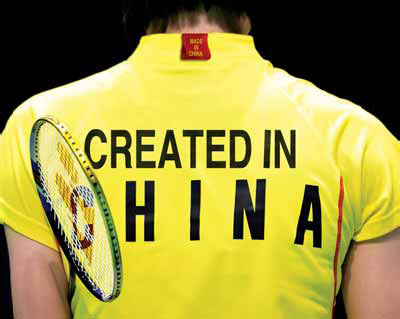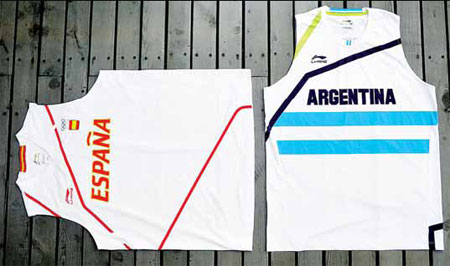Tailored in China, for Team World
Updated: 2012-07-29 07:46
By Erik Nilsson, Wu Ying, Cecily Liu, Wang Zhenghua and Tiffany Tan(China Daily)
|
|||||||
|
Photo by AFP, Digital illustration by Tian Chi / China Daily |
|
Provided to China Daily |
The record number of Olympic teams clad in clothes bearing Chinese innovations brings a "made-in-China" to "created-in-China" paradigm shift to the London Games. Erik Nilsson, Wu Ying, Cecily Liu, Wang Zhenghua and Tiffany Tan report.
While much ado has been made about the fact that Team USA's uniforms for the London Olympics are made in China, less attention has been given to the record number of foreign teams' uniforms not only manufactured, but also designed, by domestic companies.
Leading the pack is home-grown label Peak, which sponsors seven countries that will participate in 20 events in London, a major backer at the Games after Nike and Adidas. Because the design process takes months - it may take up to a year until manufacturing is complete - Peak had to turn away 10 countries that approached it for the 2012 Games.
Next up is Li-Ning, named after and founded by the Chinese Olympic champion, which sponsors teams from eight countries and more than 600 individual athletes from 17 countries across the five continents - one for every Olympic ring.
Other companies with foreign clients include Adivon, Qiaodan, Erke, 361 and Xtep. A far greater number of domestic companies manufacture uniforms, apparel and merchandise developed at home and abroad.
"The phenomenon indicates domestic sportswear companies are rapidly growing and earning a say on the international stage," says Jian Jie, senior sponsorship products manager of Li-Ning's sports resources products department.
"It also shows that brand influence becomes increasingly important in the sportswear field and 'made in China' is gradually transforming to 'created in China'. The alliance between a domestic brand and an international brand can internationalize Chinese brands and generate greater access to the partner's market.
"The alliance during the Olympics can also increase the exposure of the domestic brand, promote its brand value and further its recognition at home and abroad. Through cooperation with the foreign brands, domestic brands can also improve."
Li-Ning's International Legion sponsors Argentina's basketball team; Spain's basketball team; and the badminton teams from Singapore, New Zealand and Australia. The track and field teams from Zimbabwe and Eritrea also wear Li-Ning. The company also made Sweden's ceremonial uniforms.
It became China's first sportswear brand to sponsor a foreign Olympic team when it sponsored France in 2000.
Liu Xiang, deputy director of Peak's brand management center's PR department, says: "Chinese sportswear brands are gaining influence internationally thanks to an increasingly powerful China and the country's sports achievements.
"Brands with rich sponsorship resources and marketing systems like Peak will receive more international attention."
Stavros Michaelides, public relations and marketing administrative officer of the Cyprus National Olympic Committee, says the reason the committee went with Peak is simple: "We got a better offer from Peak."
The committee's treasurer Damianos Hadjidamianou explains that Cyprus' delegation is small, with 13 athletes and about 100 people in total, including coaches and officials.
"That makes it hard for big companies to design our materials," he says.
Michaelides explains Cyprus didn't request specific designs for every team but, rather, a generic design for all sports.
Hadjidamianou says: "Not only the style but also the quality of Peak's uniforms is superb. The time of delivery is also very prompt. Whenever they say they'll deliver, they do it earlier than they say. That matters a lot to us."
He says Cyprus didn't even talk to another sponsor because the committee was more than satisfied with its uniforms for the 2008 Games and other international sports events.
The press attache of Team Slovenia Brane Dmitrovic says the committee initiated cooperation with Peak last year and plans to extend it.
"Extensive discussions have shown we share common views on the development of sport, we appreciate the same values and we want to provide the best possible conditions for athletes to achieve peak performance, which includes sports equipment," Dmitrovic says.
"The collection is a mixture of Slovenian national sports design guidelines and Chinese high-production technology. The design in green, blue and white represents three natural beauties of Slovenia: green - beautiful nature and landscape; blue - sea; and white - snow with mountains.
"This combination of colors is very unique and very noticeable. (It) also includes an outline of Mount Triglav - the highest Slovenian mountain."
Zheng Hao, manager of the design department of general stores of Peak's Beijing R&D center, says: "It's rare to see uniforms that combine traditional clothing culture with modern technology. It's challenging to integrate historic cultures with sports, but we tried our best - and we did it."
Peak's Liu explains that upon sealing a sponsorship, the company researches the country's history, culture, economy, religion, customs and languages.
"We respect different clients' cultures in the design process," Liu says.
Adivon, which designed for Syria, Cote d'Ivoire and Lesotho for the London Games, also incorporates its clients' cultures in its creations, chief brand officer Liu Feng says.
The countries it created for this year fit its brand identity - "new heroism" - which it developed in late 2011.
"It redefines the concept of heroes, while advocating happiness in sports," Liu Feng says.
"Never judge a hero on the basis of success or failure, or numbers of medals. We chose to sponsor these three countries because we found new heroism in them - Syria, in particular. Syria has suffered years of war and lacked sports environment and facilities, but its athletes still compete in many big events, which best interprets new heroism.
"We also hope that through these three teams, we can bring the new heroism concept to other countries to inspire a new generation."
Adivon solicited ideas from the public and finally chose a shirt called "Peace", the concept of which came from a Syrian studying in China.
"The unstable situation in Syria, and the peace and friendship represented by the Olympics, inspired the Syrian student, who put 'peace' in different languages on the shirt to advocate world peace," Liu Feng says.
"The idea was well-received, and our designers integrated the idea into Adivon's new logo. Thus, the simple but meaningful Peace T-shirt was created and became popular in the market."
But it's not only designers who are innovating. Manufacturers are, too.
Costco Wholesale in the US selected Jiaxing Cloud Dragon Garment Co to produce 127,000 Olympic garments for fans in 17 countries in North America and Europe during the London Games because of the manufacturer's innovations in embroidery, equipment and fabric.
General manager Ren Long explains the company had to develop new fabric varieties for the order. The most impressive innovation, which it made for another order, is carbon fiber heated from inside by lithium batteries.
Peak's creative solution to the design versus manufacturing gap is to produce 40 percent of the wares it develops.
"Once our factory in Shandong province is completed, we'll manufacture more by ourselves," Liu Xiang says.
The ideal ratio of design to manufacture is 50-50, he adds.
"The balance can help us control costs and cope with market fluctuations," Liu Xiang says.
"The cost of self-manufacturing is now roughly equal to the cost of contracting our outside manufacturers, thanks to our strict cost-control system. But self-manufacturing makes us more flexible in face of market fluctuations.
"We can increase or decrease our orders according to market demand to avoid production shortages or excessive stock."
Liu Xiang explains that, while many Chinese brands cut expenses and shrink their scope to focus on the domestic market, Peak's input in this Olympics is 10 times that of 2008.
"With the help of this Olympics, Peak intends to expand its international influence and become the leading sportswear brand in the seven (sponsored) countries," he says.
"Only by entering the international market and joining the global competition will Chinese brands become stronger and be able to compete with top international brands."
Contact the writers at sundayed@chinadaily.com.cn.
(China Daily 07/29/2012 page1)

